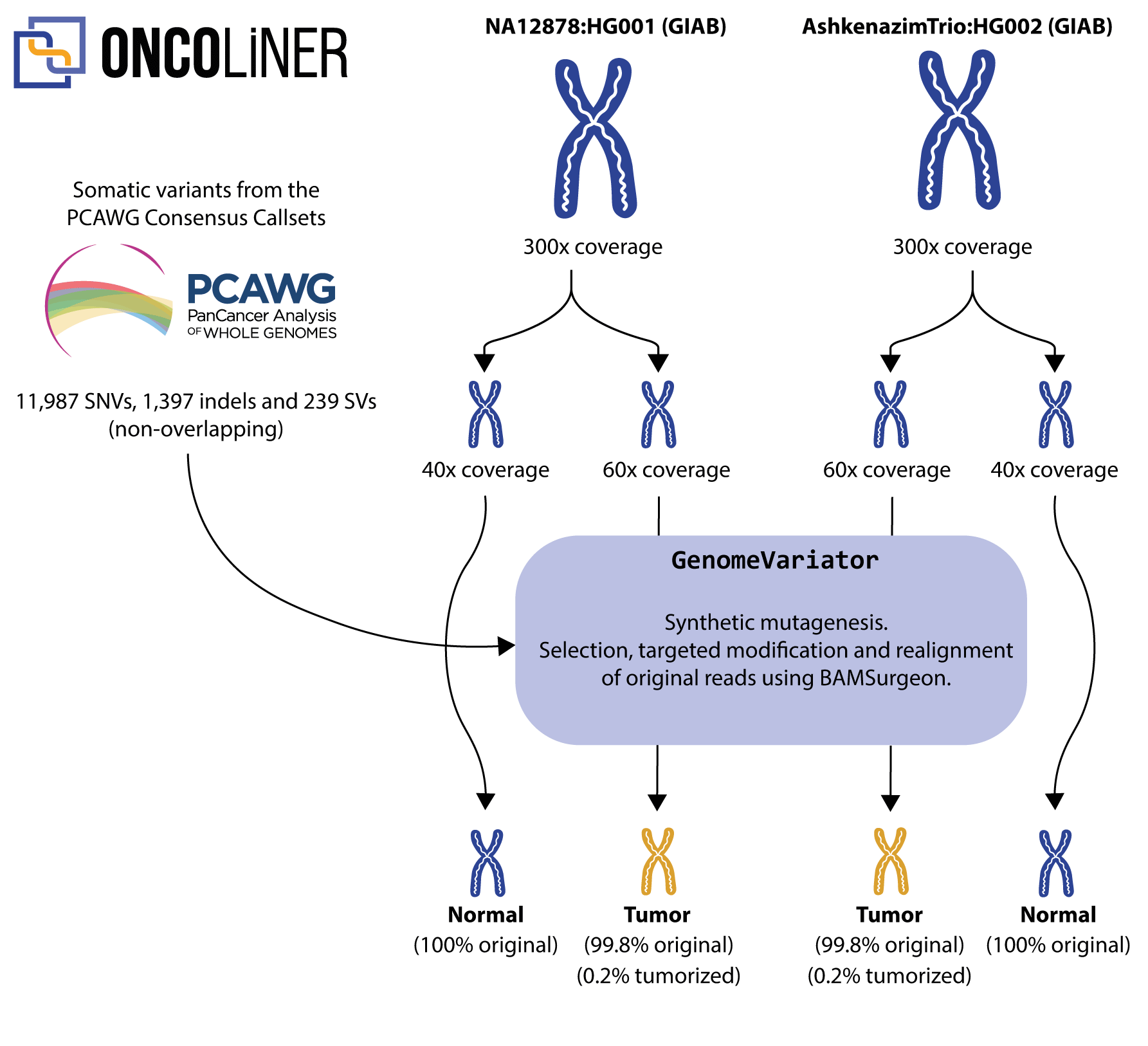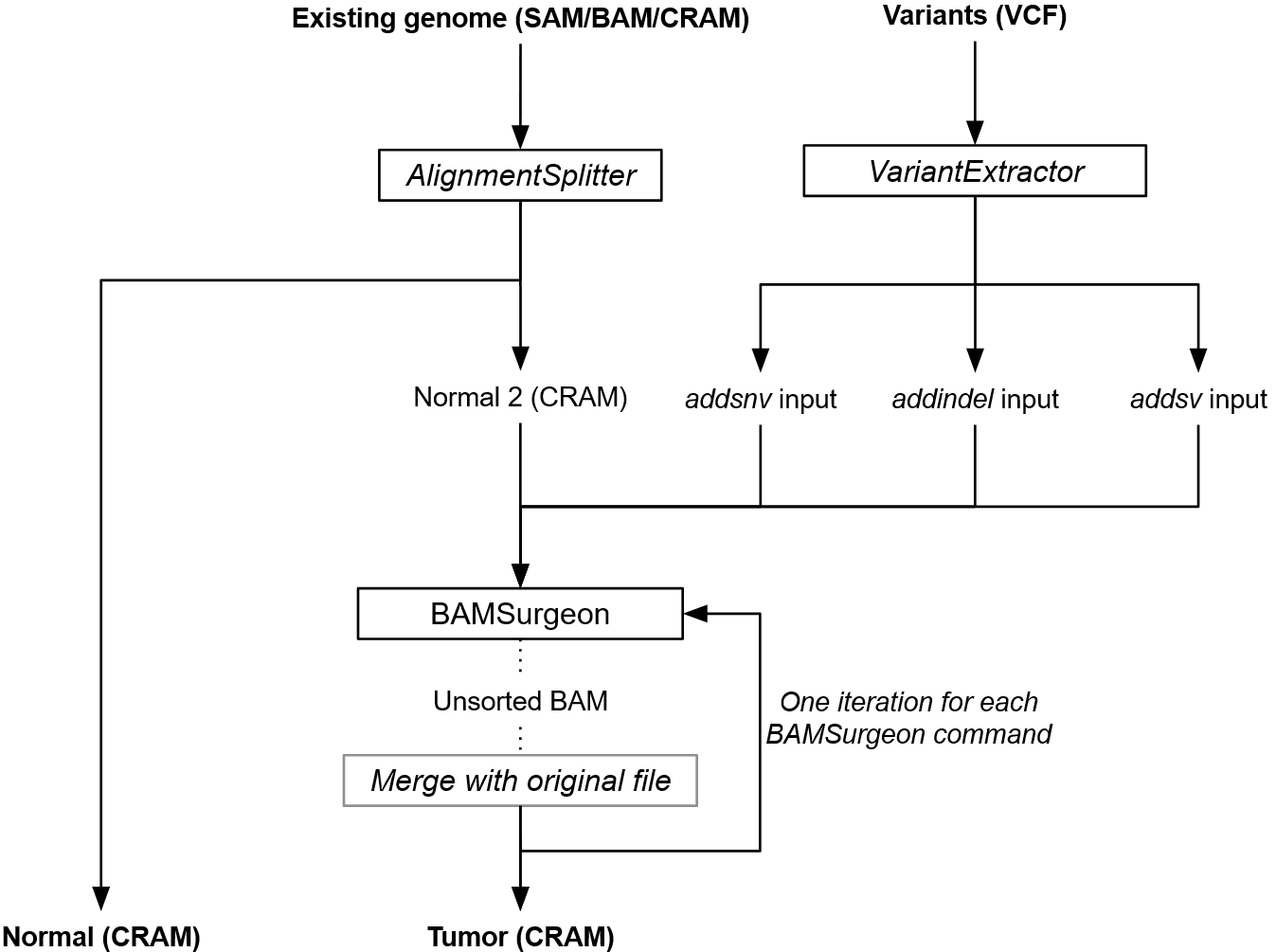GenomeVariator is a tool for adding genomic variants to an existing genome (in SAM/BAM/CRAM format). Currently supported variants are SNVs, indels and SVs (insertions, deletions, translocations, inversions and duplications). It generates realistic genomes as almost always less than 99% of the original real genome is modified. The variants must be provided in a VCF compatible format (VCF/BCF/VCF.GZ). The tool is written in Python and uses BAMSurgeon under the hood to generate the tumorized genomes.
The limited availability of real validated datasets for variant calling benchmarking makes this exercise difficult. This is why tumorized genomes are currently complementing these real datasets. Tumorized genomes ensure the data protection of patients, because they are not identifiable, and thus remove the need for bureaucratic processes that slow down progress in the field of cancer research. Furthermore, tumorized genomes enable researchers to have absolute control over the features and variants they contain.
GenomeVariator is framed under EUCANCan’s (EUropean-CANadian Cancer network) second work package and is used to complement the benchmarking datasets of ONCOLINER. The generation workflow is provided as a standalone Python script with a command-line interface and is optimized for running in a multi-core environment, more precisely in a single node of MareNostrum 4.
We recommend using singularity-ce with a version higher than 3.9.0. You can download the Singularity container using the following command (does not require root privileges):
singularity pull genome-variator.sif oras://ghcr.io/Computational-Genomics-BSC/genomevariator:latest
If you want to build the container yourself, you can use the singularity.def file (requires root privileges):
git clone --recurse-submodules --remote-submodules https://github.com/Computational-Genomics-BSC/GenomeVariator
sudo singularity build --force genome-variator.sif singularity.def
You can download the Docker image using the following command:
docker pull ghcr.io/Computational-Genomics-BSC/genomevariator:latest
You can build the Docker container with the following command (requires root privileges):
git clone --recurse-submodules --remote-submodules https://github.com/Computational-Genomics-BSC/GenomeVariator
docker build -t genome-variator .
The process of generating an tumorized genome with genomic variants from an existing human genome solely consists in adding the genomic variants to the alignment file of an existing genome. This requires the use of the AlignmentSplitter and Tumorizer scripts.
First, split the input file into two files (Normal and Normal 2 samples) using AlignmentSplitter. Assuming you have a singularity image called genome-variator.sif, following is an example of how to divide an 300X input CRAM file into two 30X CRAM files in a 16-core and 32 GiB RAM machine:
singularity exec genome-variator.sif python3 -O /GenomeVariator/src/alignment_splitter.py -i in_300X.cram -ic 300 -o splitted_ -oc 30 -sc 2 -p 16 -s 0
mv splitted_0_30X_0 normal_30X.cram
mv splitted_0_30X_1 normal_2_30X.cram
Finally, add the variants to the second normal CRAM file using the Tumorizer:
singularity exec genome-variator.sif python3 -O /GenomeVariator/src/tumorizer/main.py -i normal_2_30X.cram -o tumor.cram -f ref.fa -v variants.vcf --vaf 0.5 -td results_tmp -p 16 -mm 32 -s 0
usage: alignment_splitter.py [-h] -i INPUT [-f FASTA] -ic INPUT_COVERAGE -o
OUTPUT -oc OUTPUT_COVERAGES
[OUTPUT_COVERAGES ...] [-sc SAMPLE_COUNT]
[-p MAX_PROCESSES] [-s SEED]
optional arguments:
-h, --help show this help message and exit
-i INPUT, --input INPUT
Input alignment file
-f FASTA, --fasta FASTA
Reference fasta file (required for CRAM files)
-ic INPUT_COVERAGE, --input-coverage INPUT_COVERAGE
Input file coverage
-o OUTPUT, --output OUTPUT
Output prefix
-oc OUTPUT_COVERAGES [OUTPUT_COVERAGES ...], --output-coverages OUTPUT_COVERAGES [OUTPUT_COVERAGES ...]
Output coverages
-sc SAMPLE_COUNT, --sample-count SAMPLE_COUNT
Number of samples to generate for each output coverage
-p MAX_PROCESSES, --max-processes MAX_PROCESSES
Number of max processes
-s SEED, --seed SEED Random seed
usage: main.py [-h] -f FASTA_REF -v VCF_FILE -i INPUT_ALIGNMENT -o
OUTPUT_ALIGNMENT [--vaf VAF] [--donor DONOR] [-td TMP_DIR]
[-tds TMP_DIR_SIZE] [-p PROCESSES] [-mm MAX_MEMORY] [-s SEED]
optional arguments:
-h, --help show this help message and exit
-f FASTA_REF, --fasta-ref FASTA_REF
Reference FASTA file
-v VCF_FILE, --vcf-file VCF_FILE
VCF file with variants
-i INPUT_ALIGNMENT, --input-alignment INPUT_ALIGNMENT
Input alignment file (SAM/BAM/CRAM)
-o OUTPUT_ALIGNMENT, --output-alignment OUTPUT_ALIGNMENT
Output alignment file (SAM/BAM/CRAM)
--vaf VAF Variant allele frequency (0.0-1.0)
--donor DONOR Donor alignment file (for BAMSurgeon)
-td TMP_DIR, --tmp-dir TMP_DIR
Directory where temporal files are stored
-tds TMP_DIR_SIZE, --tmp-dir-size TMP_DIR_SIZE
Maximum size of temporal directory (in GB)
-p PROCESSES, --processes PROCESSES
Maximum number of processes
-mm MAX_MEMORY, --max-memory MAX_MEMORY
Maximum memory usage (in GB)
-s SEED, --seed SEED Random seed
- Rodrigo Martín - Code and Scientific Methodology - ORCID GitHub
- David Torrents - Scientific Methodology - ORCID
This project is licensed under the BSC Dual License - see the LICENSE file for details.

